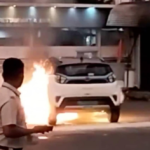What Happens To Your Engine When You Suddenly Change Gear Down In High Speed? Hey, folks! Have you ever wondered what will happen if you put a gear down in your car and that too at a quite high speed? Well, driving a vehicle involves understanding the intricacies of its gears and how they interact with the engine. One important aspect is knowing when to shift gears appropriately. However, there may be situations where a driver mistakenly shifts into first gear at a high speed. This article explores the potential consequences of such an action, shedding light on what happens to your car when you suddenly shift it into first gear while traveling at 100 km/h.
Well, you must have heard people talking that shifting gear down at high speed should not be there because it leads to several things such as accidents and disbalance and so on. Also, it impacts the engine. It is generally recommended to avoid downshifting at high speeds unless there is a specific need or emergency situation. Properly utilizing the brakes, maintaining a safe speed, and operating within the recommended RPM range for your vehicle are more reliable and safer approaches to driving at higher speeds.
Why You Should Not Shift Gear In High-Speed?
Shifting down gears in high-speed situations is generally not recommended due to several reasons. First and foremost, it can put excessive strain on the engine and transmission components. When you shift down at high speeds, the engine’s RPM increases abruptly, causing the engine to work harder to match the higher gear ratio. This can lead to accelerated wear and tear, potentially resulting in mechanical failures over time.
Moreover, downshifting at high speeds can disrupt the balance and stability of the vehicle. It can cause sudden changes in traction and weight distribution, making it difficult to maintain control of the vehicle. The abrupt deceleration caused by downshifting can unsettle the suspension, resulting in decreased stability and an increased risk of skidding or losing control, especially in unfavorable road conditions.
Additionally, downshifting in high-speed situations may not provide the desired benefits in terms of braking or acceleration. Modern vehicles are equipped with advanced braking systems that are specifically designed to handle deceleration at high speeds. Relying on engine braking alone by downshifting may not be as effective as using the dedicated braking mechanisms, potentially leading to longer stopping distances and increased risks.
Engine Strain and Damage
When you shift into first gear at 100 km/h, the abrupt decrease in gear ratio causes the engine’s rotational speed (RPM) to increase dramatically. This sudden spike in RPM places a tremendous strain on the engine and its components. The engine’s internals, including pistons, connecting rods, and crankshaft, are not designed to handle such high RPMs at low gear ratios.
The increased stress on the engine can result in severe damage, such as bent valves, damaged pistons, or even a broken crankshaft. The strain caused by this sudden shift can also lead to overheating, as the engine struggles to dissipate the excessive heat generated under such conditions.
Loss of Control and Safety Concerns
When you suddenly shift into first gear at a high speed, the immediate and substantial decrease in gear ratio can cause a sudden deceleration, leading to a loss of control over the vehicle. The tires may lock up, causing the car to skid or slide, especially if the road surface is wet or slippery.
Furthermore, the abrupt change in gear ratio can shock the drivetrain, potentially causing a jerking motion or stalling of the engine. This can be particularly dangerous if it occurs in a critical situation, such as during overtaking or navigating through heavy traffic.
Transmission and Clutch Damage
Shifting into first gear at high speed also has adverse effects on the transmission and clutch components. The sudden engagement of the low gear ratio places immense stress on these components, leading to accelerated wear and tear. The transmission’s synchronizers, designed for smooth gear changes at appropriate speeds, can be damaged or worn out due to sudden engagement.
Additionally, the clutch may experience excessive heat and wear, potentially resulting in a slipping clutch or even complete failure. Both transmission and clutch repairs can be expensive, further highlighting the importance of avoiding such actions. Shifting into first gear at a high speed, such as 100 km/h, can have severe consequences for your car. The sudden and significant decrease in gear ratio places immense strain on the engine, potentially causing damage to its components.
The loss of control and safety concerns associated with such an action should not be overlooked, as it can result in accidents or collisions. Moreover, the transmission and clutch are also at risk of damage due to the abrupt engagement at high speeds. It is crucial to drive responsibly, understand the appropriate gear shifts, and avoid sudden gear changes that could harm your vehicle and compromise your safety on the road. Stay tuned with us to read more articles on such information.






GIPHY App Key not set. Please check settings